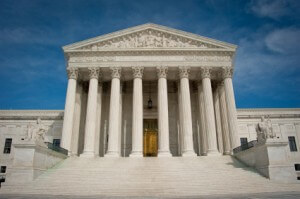ULC Court Cases: Fulton v. Vickery
August 13th, 2012
Case Background

A North Carolina woman's suit against a ULC minister ended up allowing our ministers to perform wedding ceremonies in North Carolina.
On March 5, 1985, Lynn Stone Fulton appealed the Superior Court of Orange County, North Carolina decision in the case Fulton vs. Vickery. Lynn Fulton charged Charles E. Vickery and the Universal Life Church, Inc (an organization unaffiliated with the original ULC of Modesto, CA that Vickery was a member of) of having deceived her into a void marriage to Thomas A. Fulton Jr. The Court of Appeals ruled that the marriage in question had been validated by statute, and even if it wasn’t, there was no proof that the defendants attempted to commit fraud.
Lynn Fulton was married to Thomas Fulton on June 7, 1972. Vickery performed the marriage as an ordained minister of the ULC. He obtained his ordination through the Universal Life Church of Modesto, CA via mail order. The ULC offers ordinations to anyone that wants to become an ordained minister, regardless of their religious background. The Fultons separated on May 29, 1979. Thomas Fulton was deeded the property and in turn would pay Lynn Fulton the value of her share.
Case Proceedings
Lynn Fulton was attempting to be awarded both compensation and punitive damages from the court of appeals. A complaint was never served to Vickery, who was a defendant when the case was in the Superior Court, and therefore was not involved in the appeal. Thomas Fulton and the Universal Life Church legal team both pled the statute of limitations as their defense. Thomas Fulton and the Universal Life Church legal team also argued that awarding the plaintiff damages would violate their First and Fourteenth Amendment rights.
Lynn Fulton filed suit against Thomas Fulton on March 1980 in order to enforce the separation agreement. On December 2, 1980, the North Carolina Supreme Court made a ruling regarding the one of the more important court cases regarding marriage, State of North Carolina vs. Lynch. The ruling stated that any marriage performed by a minister ordained by the ULC was not a valid marriage for the purposes of the prosecution in a bigamy case. Due to the decision of State vs. Lynch, Thomas Fulton quickly moved for summary judgment, stating that a binding separation agreement must be dependent on a valid marriage and that he and Lynn Fulton had never been lawfully married.
The North Carolina General Assembly validated any marriages performed by ministers of the ULC prior to July 3, 1981, thereby validating the marriage of the Fultons. Lynn Fulton attempted to argue this decision in court. Her first argument was that the statue named the Universal Life Church and not the Universal Life Church, Inc. The court considered the argument unfounded. Her second argument was that validating her marriage would cost her the property, and that would be against the law as her lawsuit had been filed when the curative statute was passed. The court also dismissed this as pending cases are not exempt of newly passed laws or statutes. She also argued that the summary judgment granted in the previous court cases counted as having invalidated her marriage. This was not seen as being the same by the court. The court ruled that if the summary judgment can be said to have invalidated the marriage, it did so only by implying that. The court declared that a marriage could not be voided by such indirect means.
Rulings And Outcomes
The court ruled that the marriage was valid and that any damages or compensation that Lynn Stone Fulton sought were without merit, as she could not produce sufficient proof to support any of her claims. Even if she had, each claim had a three-year statute of limitations, which had already expired. The defendants were found to have not committed fraud in regards to Lynn Stone Fulton.
Outcome: the ruling of State of North Carolina v. Lynch was reversed, allowing our ministers to perform wedding ceremonies in North Carolina
Read the court’s summary of this case here.



So the current legal standing in the State of North Carolina is that ULC Ordained Ministers CAN perform weddings in the state of NC as of 11-13-2014?
Depends on your court. Sometimes the officer does not need to be there. You go bferoe the judge and plead not guilty. the judge then sets up a court date for a trial; the officer then appears for your trial. In some states, traffic court is held on certain days and any officer who issued citations would show up in court on that day.The city I worked in had traffic court every Monday. I usually did not go. If a person entered a not guilty plea, the judge set a court date for the following Monday. I would ge told (summoned) and would appear.
Thought-provoking analysis , I Appreciate the analysis ! Does anyone know if I could possibly get a template NY DTF ET-30 document to use ?